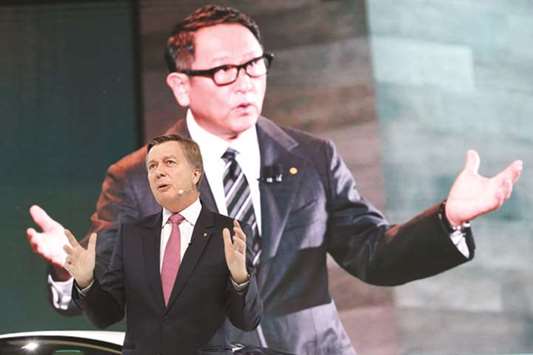Toyota Motor Corp needs clarity on the terms of Britain’s access to European Union markets after Brexit to secure production at its Burnaston plant in central England, it said yesterday.
The Japanese carmaker’s comments echo calls from businesses in both Britain and abroad for the UK government to make progress in talks on future relations with the EU following the country’s planned departure from the bloc in March 2019.
“We cannot stay in this kind of fog when we don’t know what will be the output of the negotiations,” Toyota executive vice president Didier Leroy said at the Tokyo Motor Show.
“The quicker we can get clarity about that, the better it will be (for) the way we can prepare for the future.”
Toyota, which employs more than 3,000 people in Britain, builds the Auris hatchback and the family Avensis car at Burnaston.
Sources told Reuters this month the company would build the next Auris model at the plant assuming Britain secured a transitional deal with the EU.
Toyota said in March it would invest £240mn ($317mn) in the plant, but retaining tariff-free access to the EU’s single market was crucial.
Leroy reiterated yesterday this was “absolutely key”.
“Today (Burnaston) exports 80%-85% of production to the European continent,” he said. “If we move to something like import tax or trade tax or any kind of additional penalty, it will create a big negative impact in terms of competitiveness (...) and if competitiveness is not secured, we have to think about what we will do for the future.”
He said Brexit talks, currently deadlocked over the divorce bill, needed to move on to future trading relations.
“If the negotiations are postponed and postponed again, it’s clear that it creates some things that are not good for us,” he said.
Asked about Toyota’s concerns, Britain’s finance minister Philip Hammond said he was confident the government would be able to satisfy businesses’ need for certainty.
“I think that we stand a very good chance of being able to agree a transition deal with the European Union shortly after the December council,” he told reporters.
“I can’t tell you exactly when it will be, but I think we can expect to make good progress to agreeing a transition deal and to seeing the shape of an end-deal emerging as a political agreement as we go through this process.”
Britain said yesterday it wanted an outline agreement on a transitional deal by the first quarter of 2018. It is seeking a two-year implementation period after March 2019, during which its access to the EU single market would stay largely unchanged while new arrangements are put in place.
There were signs of a potential breakthrough in Brexit talks last week when EU leaders said they would begin preparations to move into “phase two” in December, a step that would allow London to discuss its future trade relationship with the bloc.

Toyota Motor’s executive vice president Didier Leroy presents the company’s Concept-i series as a screen shows the company’s president Akio Toyoda during media preview of the 45th Tokyo Motor Show yesterday. The company needs clarity on the terms of Britain’s access to European Union markets after Brexit to secure production at its Burnaston plant in central England, he said yesterday.
